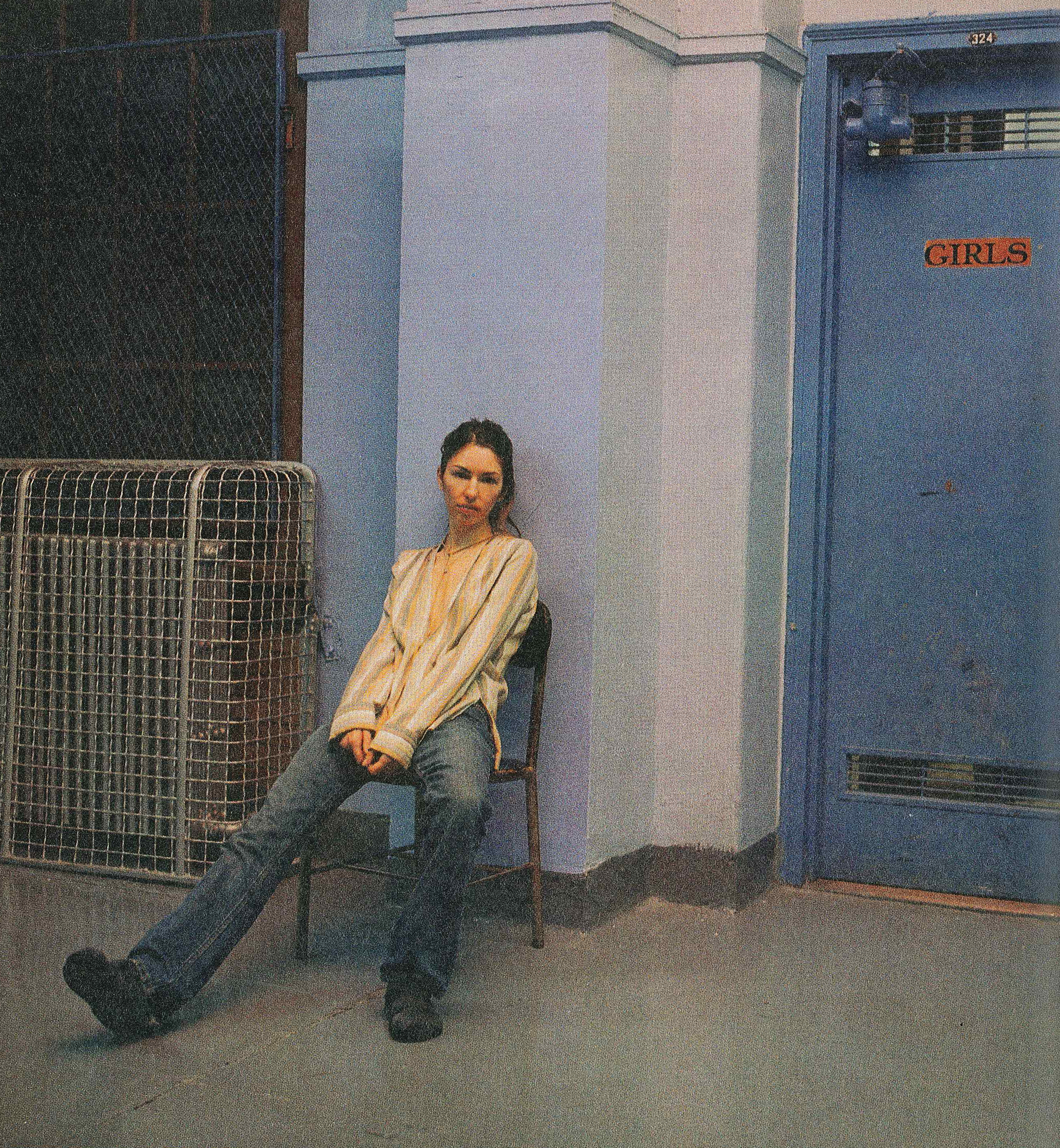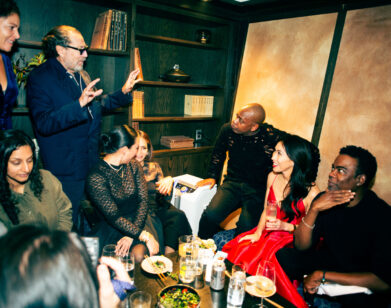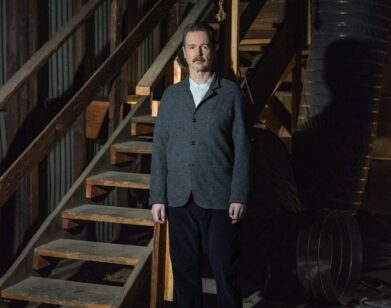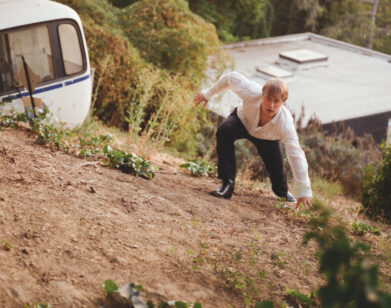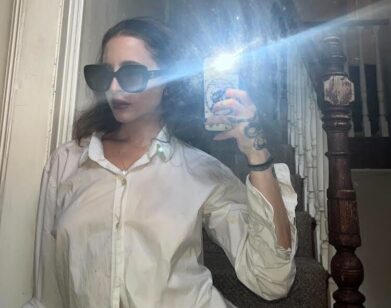Revisited: Sofia Coppola
When author Lisa Krueger interviewed Sofia Coppola for our April 2000 issue, she was spritely and coy, talking about her desire to write an original script. She was known mostly for being the daughter of high-profile director Francis Ford Coppola. She had made dozens of cameos in her father’s movies, possibly because she was always on set and available. Though she took on roles like “Little Girl” in The Outsiders (1983) and Mary Corleone in The Godfather: Part III (1990), acting wasn’t in the cards for young Coppola. “I never really wanted to be an actress,” she says over the phone from her New York office. “I just did it when my dad asked me to.”
When she graduated to directing, and people saw 1999’s suburban onslaught The Virgin Suicides, all tangential mentions of her father abetting her success melted away. (He refused to help her secure the rights to Jeffrey Eugenides’s novel, so she adapted the screenplay herself). It was gorgeous, revolutionary, and a reinvigoration of the teen film genre. Whether or not directing runs in her blood, she has midwifed hit film after hit film, leading up to her most recent release, this year’s The Beguiled. Her movies speak for themselves, often slow-moving portraits with bittersweet emotional palettes that have perfectly lended themselves to Tumblr’s nostalgic algorithms. How Coppola keeps audiences—whether they’re watching hotel room strippers pole dance to the Foo Fighters or virginal Civil War teens grapple with the arrival of a Confederate soldier—glued to the screen is a talent unmatched by any of her peers.
INTERVIEW, APRIL 2000 ISSUE. INTERVIEW BY LISA KRUEGER
LISA KRUEGER: You’ve done a lot of things. You’ve done acting and I know you were a clothing designer.
SOFIA COPPOLA: And I have a little clothing company with a friend. And I tried going to art school after appearing in The Godfather: Part III (1990), when I realized that acting wasn’t something I was still wanting to pursue.
KRUEGER: Do you think acting might have in some way led you to directing?
COPPOLA: It’s weird, because I never studied directing and I never really thought about doing it, and then I just found myself in that situation and tried it. I like to be observing everything else, and I get self-conscious in front of the camera.
KRUEGER: Growing up in a family where everyone was so creative, did you feel any pressure to work in movies?
COPPOLA: My parents were always encouraging of us being creative however we wanted to be. People say, “You didn’t get pressured into having to be a director?” But it’s hard to be around my dad and not be curious about filmmaking, because he thinks it’s the ultimate medium.
KRUEGER: Would you say that you yourself had a so-called “normal” teen life?
COPPOLA: My whole upbringing was pretty unconventional, because we would always go on location with dad. But I went to high school in a small town in the Napa Valley. It was pretty normal.
KRUEGER: That was part of your family’s decision, not to be in Hollywood.
COPPOLA: Yeah. I remember when I was in high school, I was a little too cool to be a teenager. So with the movie it was fun to go back and really get into being a teenager, because sometimes…
KRUEGER: Youth is wasted on the young.
COPPOLA: Right.
KRUEGER: What’s next on your agenda?
COPPOLA: I want to write another script. An original story, though that seems really daunting to me.
KRUEGER: What was your favorite part about directing?
COPPOLA: I liked shooting [The Virgin Suicides]. We shot really fast, so we didn’t have a lot of time. It was like barreling through everything.
KRUEGER: Finally, what was the part of directing you liked the least?
COPPOLA: Music clearance.
INTERVIEW, OCTOBER 2017. INTERVIEW BY TREY TAYLOR.
TAYLOR: There’s a quote that’s attributed to Lost in Translation (2003) that has wormed its way onto the internet, which goes, “I just feel so alone, even when I’m surrounded by other people.” But I looked through the script and I rewatched the movie—
COPPOLA: I don’t remember that line.
TAYLOR: I don’t think it exists. I’m wondering if someone created it and it’s fake. It’s attached to stills of the film as subtitles, circulated on Tumblr and it’s being associated with Lost in Translation.
COPPOLA: It sounds sort of familiar, but I don’t ever remember a line being that direct. Usually, I’m more interested in subtext, which we got more into in The Beguiled (2017). You don’t directly say what you’re thinking. But it sounds like it’s close to something in there. I don’t know, does Bill [Murray] say that?
TAYLOR: No, he doesn’t! I really did a thorough search. But that quote took over Tumblr.
COPPOLA: It sounds vaguely familiar but I can’t place it.
TAYLOR: So I guess it’s safe to say it doesn’t exist. [laughs] I also wanted to know, because my favorite scene from Lost In Translation is where Scarlett’s character is looking over the Tokyo skyline and that Squarepusher song plays…
COPPOLA: When she’s sitting on the window ledge?
TAYLOR: Yeah, I just wanted to know why you thought it was important to include?
COPPOLA: That whole thing was about her not feeling connected and her isolation, and the whole movie was this rhythm between moments of her alone and connecting with [Bill Murray’s character], so it was a moment of her being small and high up in this huge city and her feeling of disconnect. I always try to use visuals to convey what the character is feeling so at that moment, she’s kind of small and overwhelmed in this huge cityscape.
TAYLOR: People often use stills or clips from your films to talk about depression or loneliness online. How does that make you feel?
COPPOLA: [laughs] That’s funny. I mean there is an aspect of melancholy where I can see that comes from but I think there’s other emotions too—it’s not all a downer! But I think my first movie, The Virgin Suicides (1999), had that and [The Beguiled] reminded me in some parts of The Virgin Suicides. That’s why it appealed to me because I felt like I was going back to something that I first started with, but then approaching it in a different way. I know [Suicides author] Jeffrey Eugenides, they told me he was into The Beguiled so maybe there’s some connection there, but I don’t know what to say about that. I can definitely understand that I have association with melancholy style but I hope and feel there’s other sides too.
TAYLOR: You’re so good at making things visually so beautiful, that it’s almost sad but makes you happy watching it, if that makes sense?
COPPOLA: Yeah, I love that feeling of when it’s touching and it makes you happy but there’s a melancholy or bittersweet glaze to it. So I guess I like that feeling too.
TREY TAYLOR: Have you seen Don Siegel’s 1971 version of The Beguiled?
SOFIA COPPOLA: Yes, I saw it a few years ago when my correction designer friend said, “You should see this movie!” But after that, I never saw it again because I tried to forget that version and then I got the book and tried to approach it in my own new way.
TAYLOR: What did you originally think of the film?
COPPOLA: It was pretty wild. I was surprised that Don Siegel and Clint Eastwood made that movie, but I took it as sort of a Don Siegel departure. He was stretching himself. It was such a guys point of view of this group of women, the way that they were dealing with their desire, that it was pretty entertaining. I know it’s a classic of that genre but I was excited to make a different version with their point of view.
TAYLOR: I was so shocked watching that clip of Clint Eastwood kiss the 12-year-old [Pamelyn Ferdin].
COPPOLA: Yeah the little girl—I forgot there’s a lot of ’70s treatment of things. [laughs]
TAYLOR: How did that make you feel? Because I read that it was not consensual.
COPPOLA: You mean when they shot it?
TAYLOR: Yeah, I read that it wasn’t in the script and he just went for it to get a surprised reaction from her.
COPPOLA: I didn’t know that! But I think it’s in the book. I’m pretty sure … I’ll have to check. Maybe he added that, but definitely their whole take on it was ’70s and it was pretty clear in that one that [Eastwood’s character is] the bad guy where I wanted it to be a little more ambiguous, where you’re not sure and kind of discover [Colin Farrell’s character].
TAYLOR: So what did you want the audience to see, specifically, through the eyes of the women?
COPPOLA: I was thinking that I wanted to make something women could connect to. Like gay men and woman, just more relatable characters, that they were more human and not just like, in the way that we have a desire of this hunky guy but that they weren’t crazy because they had feelings of desire and to have fun with it. They were kind of portrayed as crazy in the first film.
TAYLOR: I know you guys played around a bit when you weren’t shooting, did any of that end up in the film at all?
COPPOLA: No, we tried not to be too silly in the actual filming even though they’re all in these period costumes and stuff on set. It was so funny to see them in real life with those red plastic cups, so we had fun too but I never wanted the movie to turn into a camp fest, which it could easily have been. I think because Nicole [Kidman] is so great, she was able to walk that thin line between humor and also being really genuine.
TAYLOR: I love her in that movie To Die For (1995).
COPPOLA: Me too! That’s my favorite role of hers. She’s done so many, I love her in those also but I really love her in that.
TAYLOR: Can you tell me the story of how you came to cast Colin Farrell in the role of the hunky soldier?
COPPOLA: I had met him back in the ’90s and I always thought he was cute and a good actor and then my casting person mentioned him for this. He’s so charming. The character in the book was Irish and I heard him speak in his accent and I thought it was just another layer of making him more exotic and foreign to these women.
TAYLOR: Did you think at all about how he used to date Britney Spears?
COPPOLA: No, but we asked him about that. I forgot about that.
TAYLOR: What did he say?
COPPOLA: I don’t think he remembers that much of that time because it was before he was sober. [laughs] I have a soft spot for Britney, I love those pictures of them.
TAYLOR: Were you expecting the film at all to be controversial?
COPPOLA: I didn’t really expect it to, but I wasn’t surprised. I realize that when you do something set in the Civil War it’s going to touch people and people are going to have issues. Also, the PC police are out strongly these days.
TAYLOR: Does that bother you, how much people look into things and try to find issues?
COPPOLA: I feel like the internet has encouraged that because people have a lot of opinions. I think it’s really important to encourage artistic freedom. I think if you inhibit that, that could be dangerous.
TAYLOR: When people say this is your most conventional or easily watchable film, does that make you happy?
COPPOLA: [laughs] It’s the first time I ever did anything in this genre so for me it was fun to do something different and to really focus on a plot and try to make something entertaining. So it was interesting for me to do something different. So I’m pleased if anybody thought that.
TAYLOR: In our April 2000 issue, you said that the worst part of making a movie was music clearance. I was wondering if you feel the same way?
COPPOLA: [laughs] That’s so funny, I must’ve been sick of it at that time. With this one, I didn’t have a lot of music clearance to deal with. But it can be a bummer because you can get attached to a song and then it’s too expensive, but yeah it’s just the legal side, I don’t know if I would say that now because I haven’t had that experience lately, but should remember that.
TAYLOR: Is that why you collaborate so much with your husband [Thomas Mars] and his band [Phoenix]?
COPPOLA: Because it’s easier! [laughs] Probably, because I do like his music and I know he’ll help me out, but not to just get a deal.
TAYLOR: A lot of people would say your films are intentionally slow. Do you embrace slowness?
COPPOLA: I have regard for [Michelangelo] Antonioni, and I don’t try to be slow but it depends on the movie. I take my time when I want to. So not always but Somewhere (2010) we were seeing how much we could drag it out to show how, over time, the character is bored. So I’m in the mode of that character. It depends on the story, I’m not into being slow to make people endure it. It has to do with the characters and what I’m trying to do at the time.
TAYLOR: So you never feel like in order to challenge your audience you might push a scene to its temporal limit?
COPPOLA: I did it on Somewhere because I was trying to show what it was like for [Stephen Dorff’s character], but in general I don’t want to torture people to be patient. [laughs]
TAYLOR: Do you ever get nostalgic for something you created?
COPPOLA: No not really, I’m nostalgic of the time we shot them and stuff but I don’t really look at them that much after. But I’m excited we’re doing a Criterion of The Virgin Suicides so it’s fun to look at the old stuff.
THE BEGUILED IS AVAILABLE ON DVD AND DIGITAL DOWNLOAD NOW.

